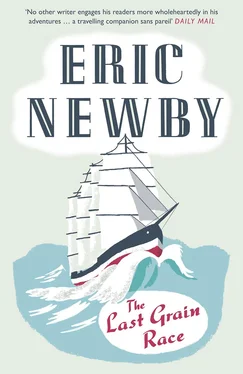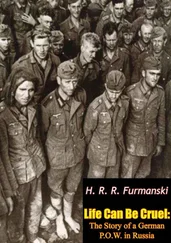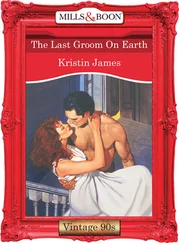The work of handling the great acreages of sail was very heavy, even for men and boys with strong constitutions. Thirty-four days out from Port Victoria, two days after we had passed the Falkland Islands on the homeward run, with a crew of twenty-eight, which included officers, cook, steward, etc., we started bending a complete suit of old, patched fair-weather canvas for the tropics in order to save wear and tear on the strong stuff, sending the storm canvas down on gant-lines. Sail changing was done always when entering and leaving the Trade Winds, four times on a round voyage. While we were engaged in this work it started to blow hard from the south-east; then it went to the south, blowing force 9 and then 10 and then 11 from the south-south-west, when the mizzen lower topsail blew out. This was followed by a flat calm and torrential rain. In the middle of the night a Pampero, a wind that comes off the east coast of South America, hit the ship when it was practically in full sail. Because the Captain knew his job we only lost one sail, the fore upper topgallant.
In those twenty-four hours the port and starboard watches, eight men to a watch, took in, re-set, took and re-set again twenty-eight sails – the heaviest of which weighed 1½ tons – a total of 112 operations; bent two new sails and wore the ship to a new tack twice, an operation which required all hands, including the cook, and which took an hour each time it was done. The starboard watch were unlucky, having to spend eleven consecutive hours on deck. This was by no means uncommon. Yet strangely enough, I look back on the time I spent in Moshulu with great pleasure.
On the day we lost the Cereal Account I finally decided to go to sea.
‘You’ve ’ad it,’ said the Porter with gloomy relish as I clocked in a little after the appointed hour at the advertising agency where I was learning the business.
I was not surprised. I was eighteen years old and had been at The Wurzel Agency for two years after leaving school on the crest of one of my parents’ more violent financial crises. They had known George Wurzel in his earlier, uncomplicated days and had placed me with him in the fond belief that the sooner I got down to learning business methods the better. By now they were beginning to feel that they might have been wrong. Wurzel’s had long held a similar opinion. Since I had ridden a bicycle into Miss Phrygian’s office they had been more than cool. Julian Pringle, the most rebellious copywriter Wurzel’s ever had, bet me that I could not ride it round the entire building without dismounting. The coast had been clear, the numerous swing doors held open, and the bicycle, which was being sketched for the front page of the Daily Mail , borrowed from the Art Department.
It was a pity that Julian did not tell me that the brake blocks were missing; perhaps he removed them. Whatever the reason, I failed to take the dangerous corner at the bottom of the main corridor and ended on Miss Phrygian’s desk. She was the Secretary to the Managing Director and carried Wurzel’s on her capable shoulders. Though it was by no means obvious at the time, she apparently never bore me any ill-feeling, and during the war Miss Phrygian’s enormous parcels of cigarettes were the only ones that consistently got through to the various P.O.W. camps I inhabited. But this kind of antic was only condoned in Layout and Ideas men of the calibre of Julian Pringle, who kept their sanity and independence by behaving atrociously whenever a Director appeared. It was nothing for a client being hurried past the Layout Department to less controversial regions to be treated to a display of paper dart flying. (Once a potential customer was hit on the nose by an ink pellet.) The Prep-School Heart still beat strongly in Layout and Ideas.
I had started my uneasy career in the Checking Department at the age of sixteen. Miss Phrygian had escorted me there. On the way we passed the Porter’s cubby hole; inside, half a dozen evil-looking messenger boys were waiting to take blocks to Fleet Street. There were more seats than messenger boys and I found Miss Phrygian casting a speculative look at the empty places. For a moment I thought she was going to enlist me in their ranks, but she must have remembered my father’s insistence on the value of the business methods I was going to learn, and we passed on.
In the narrow, airless transepts of the Checking Department, where the electric lights burned permanently, I thumbed my way through the newspapers and periodicals of the world to make sure that our advertisements were appearing on schedule and the right way up, which they failed to do quite frequently in some of the more unsophisticated newspapers from rugged and distant parts of the globe. Some of the advertisements had to be cut out and pasted in a book. We always cut out Carter’s Little Liver Pills, but I never discovered the reason. Turning the pages of thousands of newspapers day after day, I accumulated knowledge of the most recondite subjects – croquet matches between missionaries in Basutoland, reports of conventions of undertakers at South Bend, Indiana, great exhibitions for tram ticket collectors in the Midlands – the world spread out before me.
When I was not speculating about what I read, I would fight with Stan, a great dark brute of a boy, one of the two assistants in the Department, to whom I had become quite attached. Both Stan and Les, the second assistant, called me ‘Noob’.
‘’Ere, Noob, what abaht a pummel?’ Stan would croak invitingly, and we would pummel one another until Miss Phrygian banged furiously on the frosted glass of her office door to stop the din.
Les, the other checker, had a less rugged exterior than Stan and a passion for Italian opera on which he spent all his money. He would often appear in the morning, dark-eyed and lifeless after long hours in the Gallery at Covent Garden, drop a leaden hand on my shoulder and greet me: ‘’Lo, Noob. Jer ’ear Gilli lars ni’? … Bleedin’ marvellous.’
The Department was presided over by a gnome-like little man who knew everything there was to know about his job and had such a retentive memory that he could tell you without hesitation on which page of some old Regimental magazine a sherry advertisement had appeared. Quite naturally our behaviour often exasperated him and he would turn to Stan and me, who were locked in an orgy of ‘pummelling’, and say: ‘’Ere, for Christ sake! turn it in!’
From time to time we would be visited by the Contact Men who dealt personally with Wurzel’s clients and handled the advertising accounts. They would stand gingerly in our den and turn the pages of the glossy magazines with beautifully manicured fingers. They were all youngish, perfectly dressed in Hawes and Curtis suits, and they smelled of bay rum. The amorous complications of their private lives were hair-raising. One of them owned a Bentley. They all wore clove carnations every day except Saturdays when they were in tweeds and went to the ‘country’ around Sunningdale. I always felt a clod in their presence and for some time after their visits disinclined to pummel. More popular were the visits of the typists. Wurzel’s was run on pseudo-American lines and had a splendid collection. Two of the most popular were Lettice Rundle and Lilly Reidenfelt. Lilly was the more provocative of the two. It was generally conceded that Lettice was the sort of girl you married and had children by after trying Miss Reidenfelt, who was expected to run to fat.
When Miss Reidenfelt entered the Checking Department, Stan, the Man of Action, would be stricken dumb and with eyes cast down would trace bashful circles amongst the waste paper with his toe. Les, Socialite and Dreamer, knew better how to please, and, more forthcoming, usually succeeded in pinching her. At such times what little air there was would be so heavy with lust that I would develop an enormous headache of the kind usually brought on by thundery weather. When Miss Reidenfelt had finally minced away inviolate, Stan would fling himself at the piles of newspaper in the steel fixtures and punch them in torment, crying: ‘Oh, you lovely bit of gravy.’
Читать дальше












